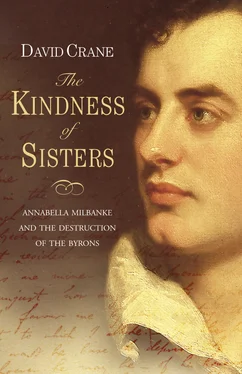If it was a serious error of judgement on Annabella’s part to imagine she could reform Byron, it was a more culpable misjudgement on his to think that he would ever allow it. It is unlikely that with Augusta so compulsively in his mind anyone could have filled her place, but as he edged inexorably towards a second proposal, it was Annabella’s fate to be almost diagrammatically the wrong person at the wrong time – a poor woman’s Dorothea Brooke, capable of change but not growth, of ardour but not compassion, sensibility but no real sympathy.
It is possible still that Byron could have forgiven Annabella for what she was, and yet he must have known, as he finally steeled himself to propose, that he could never forgive her for not being Augusta. In the early days of their courtship her virtues had been thrown into relief by the extravagances of Caroline Lamb, but seen now through the distorting prism of his ‘perverse passion’ 85 everything about her would inevitably come to seem different, her goodness primness, her certainties dogmatism, and her learning pedantry – the five foot three incarnation of all the cultural and moral littleness he despised.
Byron’s courtship of Annabella through the late summer of 1814 seems so reckless, so wantonly obtuse in the refusal to recognise the warning signals, that no conventional explanation of his actions seems quite sufficient. In his journals and letters he might describe her as his last hope of salvation, and yet if at some superficial level he managed to convince himself of that, his choice betrays a deeper compulsion to make her the causa belli of a rift with the world she embodied that had been threatening since the first success of Childe Harold .
It is this secret, unconscious, destructive agenda that gives such an air of inescapable misery to the story that unfolds with his second proposal to Annabella. On 9 September, having prevaricated as long as he could, he wrote to her from Newstead, sealing and despatching the letter ‘with the greatest haste’, according to Tom Moore, before he could have second thoughts 86 . On the same day that she received it at Seaham, Annabella wrote back, a letter of touching and honest simplicity. ‘I have your second letter’, she told him,
and am almost too agitated to write – but you will understand. It would be absurd to suppress anything – I am and have long been pledged to myself to make your happiness my first object in life. If I can make you happy, I have no other consideration. I will trust to you for all I should look up to – all I can love. The fear of not realizing your expectations is the only one I now feel. Convince me – it is all I wish – that my affection may supply what is wanting in my character to form your happiness. 87
As Byron opened the letter, Augusta at his side, he turned so pale that she thought he might faint. It never rains but it pours, was his only comment. Even so, he probably did not understand the forces he had set in motion. Nor did a fraught, uncomfortable week at Seaham at the beginning of November, that left him and Annabella as ignorant as ever of each other’s character, open his eyes.
On 24 December 1814, after further delays over the marriage settlement, he once more set off for the north, accompanied by his old travelling companion, Hobhouse, and stopped near Newmarket to spend a last Christmas with Augusta. On the 26 ththe two men continued their reluctant journey towards Seaham. ‘Never was lover less in haste’ 88 , recorded Hobhouse in his journal, and he was right. As the wedding day approached, the air of foreboding spread. In later life Annabella would speak of the sense of inexplicable dread that seized her. At the Leighs’ house at Six Mile Bottom, near Newmarket, on the morning of 2 January, at the exact time she knew that the marriage service had begun, Augusta later said that she felt as the sea must do when an earthquake moves it. The panic, the fear, the emotional turmoil were justified. She knew, as Byron had told Lady Melbourne, that her own security and reputation were wrapped up with the success or failure of the marriage. It was, though, already too late.
Almost forty years after that journey north, on the same morning that Annabella Byron and Frederick Robertson boarded the Rei-gate train at Brighton station, a woman in her late sixties, dressed in mourning and walking with a slow, shuffling step, made her painful way up the first-class staircase of London Bridge’s new terminus, and onto the narrow platform of the Brighton line.
It is unlikely that anyone who had ever known Augusta as a young girl, or seen the drawing that Sir George Hayter had done of her in her late twenties, would have recognised her. She might never have been in any conventional sense a beauty, but there had been a charm and elasticity about her that had long since gone, the woman Hayter so wonderfully captured worn away to the faded creature for whom every anxious step seemed an act of atonement to the world around her.
There was even something in the way she carried herself, her long, black shawl pulled tight around her as though she might disappear into it, that suggested the same air of surrender. For most of her lifetime she had struggled with whatever resources she could muster to keep a hostile world at bay, but just two months past her sixty-eighth birthday, and with ‘death in her face’ 89 , the Hon. Mrs Augusta Leigh had at last nothing more to give or ask than to die in peace.
She had only travelled once before on the railway, but even for someone less nervous and sick, the prospect from her window would have been a bewildering one. As the train swung southwards and left the Greenwich line and the teeming slums of Bermondsey behind, the soaring glass house of the Great Exhibition visible in the distance, it began to cross a city that was changing by the week and almost by the day, spreading and growing with the railways that were transforming it, sprouting new villas and settlements, degrading suburbs into slums and villages into suburbs in a thrusting dialectic of population, railway and building that had left any world Augusta had known far behind.
It was a new age that Augusta instinctively and rightly feared, but as the train gathered speed and finally escaped the tentacular spread of London, moving through a landscape still relatively unchanged from her youth, it was this older world that threatened most danger. For more than twenty years she had looked forward to this journey with all the optimism and placatory desire to accommodate that had characterised her youth, but as the train slowed across the common land and farms near Reigate, coming to a standstill at the heart of what one contemporary guide called England’s ‘forgotten Eden’, this older, less resilient Augusta must have known that for the last representative of a ‘serpent race’ 90 there was little mercy to be expected.
If there had been any doubts about that, the letter she had received, sent from Brighton on 11 February, would have ended them. ‘Since the cessation of our personal intercourse’, she had read in a neat, firm hand she had not seen in two decades,
you have more than once asked me to see you. If you still feel that wish, I will comply with it. We may not long have it in our power, Augusta, to meet again in this life, and to do so might be the means of leaving to both of us a remembrance of deep though sad thankfulness. But this could not be the effect unless every worldly interest were absolutely excluded from our conversation, and there were the most entire and mutual truthfulness. No other expectations must be entertained by you for a moment. On any other terms I cannot see you again, unless summoned to your Death-bed. 91
She had, too, her instructions. A fly would be waiting at the station to take her to the White Hart. When the train stopped she remained sitting where she was, a dowdily dressed figure from a previous age, waiting like some sacrificial victim at the altar of Victorian self-justification and moral rectitude to which she had been brought. After a short while a servant in drab livery carrying a visiting card appeared at her window. On the card was a name: Lady Byron.
Читать дальше










